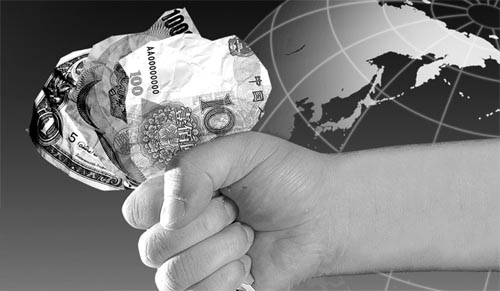Srimad-Bhagavatam/ Canto 1 / 17 /40: […] The basic principle is falsity because currency notes are issued in value beyond that of the actual reserved gold. This artificial inflation of currency by the authorities encourages prostitution of the state economy.
The price of commodities becomes artificially inflated because of bad money, or artificial currency notes. Bad money drives away good money. Instead of paper currency, actual gold coins should be used for exchange, and this will stop prostitution of gold. Full Chapter
The Himalayan Times: Is the world in a state of currency war?
The Himalayan Times | Chetan Gupta | 2010-10-09 10:21 PM — Finally, the finance minister of Brazil let the cat out of bag and declared that the world is in the midst of an international currency war and that devaluing currencies artificially has become a global trend.
Now even the head of IMF has also warned of serious consequences of deliberate currency devaluation.
It all started when despite fiscal and monetary measures developed countries could not bring their economies out of slow growth, high unemployment and slow pick up in domestic demand. This led to the latest feud over exchange rates and the idea started to circulate that currencies can be used as policy weapons and manipulated in the battle for economic recovery.
Some experts may argue it as competitive devaluation but I argue it as nothing short of a currency war and feel that far from boosting global recovery, it threatens to derail it. Tensions are growing in the global currency markets as political rhetoric heats up and countries battle to protect their industries by expanding external demand in the absence of domestic demand, raising concerns about damaging trade wars.
The Fed is preparing for another round of quantitative easing which will further weaken the dollar thus pushing the euro, yen and other emerging market currencies higher forcing some governments to take action to maintain the competitiveness of their exports. Euro is at an over eight months high against the dollar and Japan’s yen reached a 15 year high against the dollar in spite of its economy being in trouble for over two decades.
The Bank of Japan was forced to intervene twice in a month’s time for the first time after 2004 to check the rise of its currency to protect its export dominated economy. Brazil announced plans to double tax on foreign investors buying local securities, thus checking foreign fund inflow. Even Central Banks in Chile, Colombia, Peru, South Korea, Russia, Taiwan and Thailand intervened in one way or the other to drive down the value of their respective currencies.
China is often criticised by the US administration, European Union and Japanese government for keeping the value of its currency low to boost Chinese exports and make the exports from the US and other countries uncompetitive. The accusations became shriller as the ongoing crisis continues to take its toll on developed economies.
In fact the American lower house passed a bill to apply tariffs on Chinese goods to make up for the advantage China enjoys from an artificially low Yuan and a bill is being prepared that calls for China to be labelled a currency manipulator. China responded by threatening similar action.
Unilateral action by one central bank can set off disputes in other parts of the world setting a fresh round of protectionism and tariff wars something similar to the situation in the USA in 1930 which raised tariffs and led to tit-for-tat or beggar-thy-neighbour policies being adopted by other nations in the wake of the Great Depression.
Though growth through exports via weak currency seems to be the logic for overly indebted recession hit nations to get themselves out of trouble, a better solution lies in encouraging domestic demand.
Sadly the signs of a currency war are growing as major economies try to keep their currencies weak to help struggling exporters and strengthen economic growth while emerging economies are trying to check the rise of their currency to curb capital inflow, thus, reining inflation, asset bubbles and trade retaliation.








Speak Your Mind